INTERVIEW: FIRE & DUST MEETS JULIAN MATTHEWS
Julian Matthews is a former journalist and media trainer from Malaysia of mixed-race minority, finding new ways to express himself through poetry, fiction, memoir and essays. His work has been published in The American Journal of Poetry, Beltway Poetry Quarterly and Borderless Journal, among others. He stumbled onto poetry by accident in 2017 at a writing workshop, which Julian describes as a happy accident that has turned into a rabid compulsion, and says he is still extricating himself from the crash…
On 12th January 2023, Julian was the guest headliner at our virtual Fire&Dust poetry night. We caught up with him after the gig, to ask a few questions…
HCE: Tell us a little about your journey as a writer so far. What inspired you to start creating and performing poetry?
JM: In 2017, I attended the annual event to remember the 239 victims of MH370, the missing Malaysian Airlines flight from 2014. There, I heard the plea of the families of the victims to find the plane and was profoundly moved. Wreckage from the plane had washed up on the African coast and the islands off that continent but there was no trace of the main fuselage, black boxes and more importantly the people on board. The families continued to urge the government to continue the search, and still do so after nine years.
I was one or two degrees of separation from at least four of the people on that plane: a cousin and a close friend who were former flight attendants had lost their colleagues, my college mate lost his wife, and my wife lost her colleague.
I calculated it had been 1096 days since the flight went missing and imagined what those nights were like for the families who had found no closure yet. I wrote a poem, and posted it on Facebook, that struck a chord with my friends. I was asked by a friend to then recite that poem as one of the guests at a monthly reading session. The poem is entitled 1096 Nights.
I learnt that performance poetry can touch lives and move hearts in a very different way from journalism. It kicked off my interest in writing poems of topical issues and news that affected me and I began attending workshops run by mentor poets Cat Brogan, Sheena Baharudin, Bernice Chauly and creative writing guru Sharon Bakar.
I didn’t really know what a poem was back then. There were no poetry lessons that I remember from school and had very little interest in reading poems as an adult. I did enjoy spoken word performances though on YouTube, especially the Def Poetry Jam sessions with guests like Saul Williams and Sarah Kay and later, poets like Harry Baker, Shayn Koyczan, Marshall Davis Jones, Hanif Abdurraqib, Kae Tempest, Rudy Francisco, Taylor Mali, Andrea Gibson and so many others.
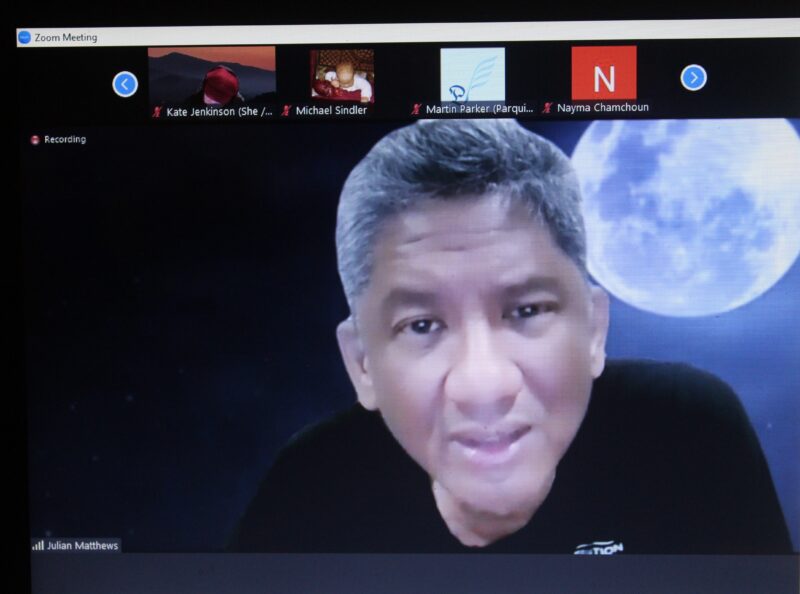
HCE: Who is your work aimed at – do you have an ideal audience in mind when you’re putting a poem together?
JM: Journalism taught me that I am always writing with readers in mind. With poetry, as egotistical as it sounds, I am mostly writing about myself. But of course, I want to entertain, to make it interesting, to home in on an emotion that audiences can relate to.
In journalism we strive to be objective and present facts, with little room to editorialise. But with poetry I can be creative and as silly, surreal or opinionated as I want – of course with the caveat of not hurting people or spewing hate. I aim mainly to relate to others with universal or subjective truths, without pontificating or being too preachy. I try to investigate through words things that bug me and hope the poem can lead me and the audience to some new understanding of the subject matter I am tackling.
HCE: Would you say there are themes or motifs that you gravitate to in your work?
JM: I try to be the contrarian for the clichés I see in other poems: why should hearts “break” (e.g. my poem “Ode to Heart”); why are clouds “lonely” (e.g. “Clouds”); what’s with all these nature motifs and Greek gods (e.g. “13 Ways To Write A Poem Like A Poet”)? I also lead a sedentary, homebody life, so I have written about ordinary things around me in persona poems about my vacuum cleaner (e.g. “Clean Break”), the rotating fan, or wire hangers. I am also a mixed-race minority, so othering or being the outsider looking in pops into a number of poems. Technology and my frustrations grappling with it (e.g. “How Many Ways Can I Prove To You I Am Not a Robot”) is another theme. Lately, I tend to write a lot about grief, healing and yearning because there have been so many deaths and losses in my life.
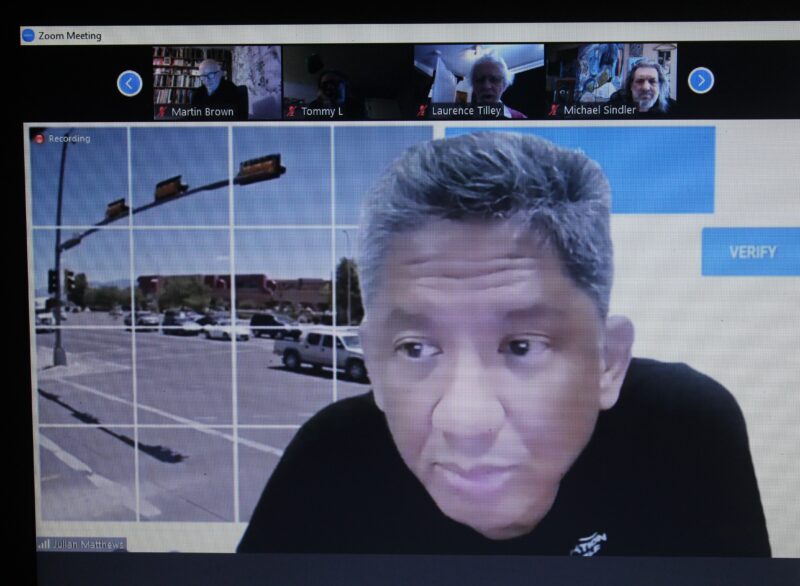
HCE: Many of your poems reflect on and celebrate aspects of humanity, showcasing your skill for imagery. What tends to come first in your writing process – do your images grow from the overall concept as it takes shape, or do you start with some clever metaphorical lines and build on them?
JM: I am with William Carlos Williams who said “no ideas but in things”. My process is quite random. A word or an image or a prompt at a workshop or on social media may trigger me. The poem finds me, I don’t go looking for it. I just build from there without knowing how it’s going to end. I see us all dipping from the same creative pool or stream of consciousness and if you don’t take the things presented to you, someone else will.
HCE: One of your poems features how the Malay term lain-lain is an anagram for another term. Many international writers report stumbling upon words, phrases or idioms from their mother tongues that are beyond translation, as they have no equivalent in English. Have you encountered any Malay examples, and what are your favourites?
JM: I admire poets who can translate other poets and retain the meaning, yet make the poem sonically beautiful. It’s an art in itself.
Lain-lain means others. As a mixed-race person, I saw this othering all my life. In the poem Lain-lain/Others, I mentioned that lain-lain is an anagram for nail-nail, “like the two in the cross” and went with that idea to its conclusion. There are usually puns, anagrams and easter eggs hidden in my poems. I am hoping some students in a poetry analysis class in the future may discover them.
The Malay language is beautiful and ancient. It can trace its history back to 2,000 BCE and old Malay was influenced by Sanskrit. You can find common Malay words in other languages spoken from Taiwan, all the way down across Southeast Asian countries and the Polynesian islands. (Fun fact: the pantoum form is derived from the Malay pantun verse form.)
I try to incorporate Malay words in my poems, sometimes, especially when they have double or even triple meaning to a native speaker. Then there’s also Manglish, a kind of English-based creole unique to Malaysia. We’re a multicultural, multiracial country so Malay, Chinese, Tamil and various other local languages and dialects also are embedded in our everyday conversations.
For example, the viral comedian Uncle Roger has made the very Malaysian colloquialisms, haiyaa and fuiyoh, common currency. But I have heard non-Malaysians using these words without knowing context, tone and delivery. Malaysians are also famous for their use of the word “lah” appended at the end of other words and sentences. It can mean different things if not delivered in the right tone.
Some Malay/Manglish/Malaysian words to look up as a fun exercise would be aisay, amboi, bojio, belanja, chinchai, geram, gostan, kacau, perasan, potong stim, shiok, waliao, yumcha.
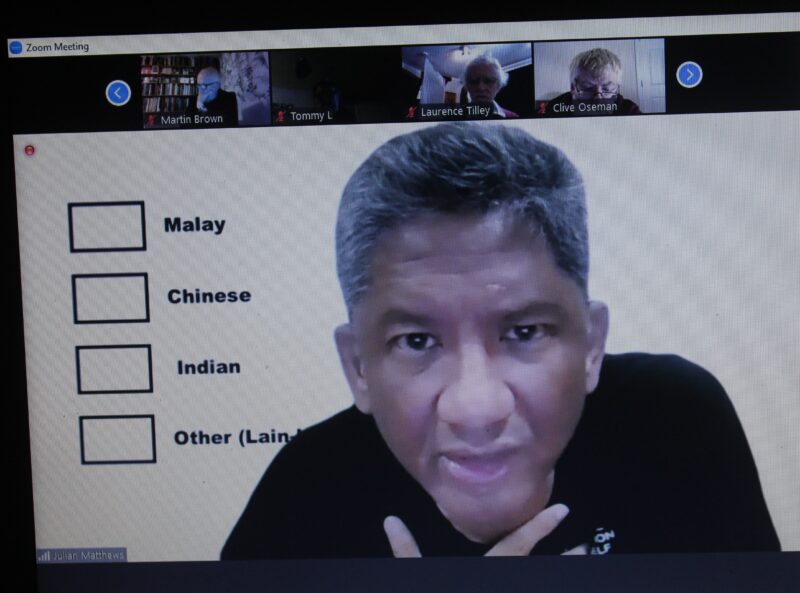
HCE: What elements do you feel most well-written poems have in common?
JM: I think “well-written poems” means different things to different readers or listeners. I am too new at this to call out what’s great and what isn’t. But I know what I like. My subjective opinion is that if the poem can outlast a generation and still bring delight or joy, or have an emotional pull or still be relatable, then it’s probably well-written. As a former journalist, I need the intro or the title (headline) to grab me. The end of the poem has to leave me wanting more. Everything in-between better be as tasty as, if you can forgive the simile, a great sandwich that someone else made for you with surprising bits inside.
HCE: When you finished the gig, it was around 21:30 for most of us, but 04:30 the next day where you were! How do you manage to stay awake, never mind give great poetry performances, for Zoom events that are happening so late?
JM: Coffee and snacks. Also, I take quick naps, by day, a lot! Actually, I really look forward to listening to the other poets. I have so much to learn! And just grateful for the democratisation of video conferencing via Zoom since Covid. The lateness for me is ideal for poetry because the neighbourhood gets very quiet and I’m unlikely to be interrupted by a spam phone call or someone knocking on my door. Also, did I mention coffee and snacks?
HCE: What type of poetry do you seek out for personal enjoyment? Have any collections/performers recently made an impression on you?
JM: I posted a list, comprising a mix of 100 classic and contemporary poets I needed to read before I die on Facebook recently. My poet friends responded by adding another 100 more! There is also a constant flow of new talents popping up on the open mics. I think that’s a healthy trend. But it’s difficult to keep up! I enjoy reading Rosemerry Wahtola Trommer every day because she writes and sends out a poem every day. Some personal faves are Cecil Rajendra (Malaysian), Andrea Cohen, Billy Collins, Dianne Suess, Dorianne Laux, Kay Ryan, Margaret Atwood, Maya Angelou, Mary Oliver, Naomi Shihab Nye, Tishani Doshi, Victoria Chang and recently Charles Simic, Vasko Popa, Langston Hughes and Bert Meyers. I go back to Kahlil Gibran, Wisława Szymborska, WS Merwin, Sylvia Plath, Charles Bukowski, John Donne, Pablo Neruda, Philip Larkin, Robert Frost, TS Eliot, Walt Whitman and Emily Dickinson every now and then. Some poets on the Zoom open mic scene who the world deserves to know more about are Christopher T George, Cathy Carson, Clive Oseman, Dig Wayne, Jeff Cottrill, Jemima Hughes, Michael Sindler, Richard Westheimer, Zomkhonto Gabadela and the host of KL Poetry Share Tee Chuan Ng. There are so many other talented poets, mentors, hosts, organisers and anthology publishers I should mention who deserve credit for all they do for poetry. I am ever grateful to all of them.
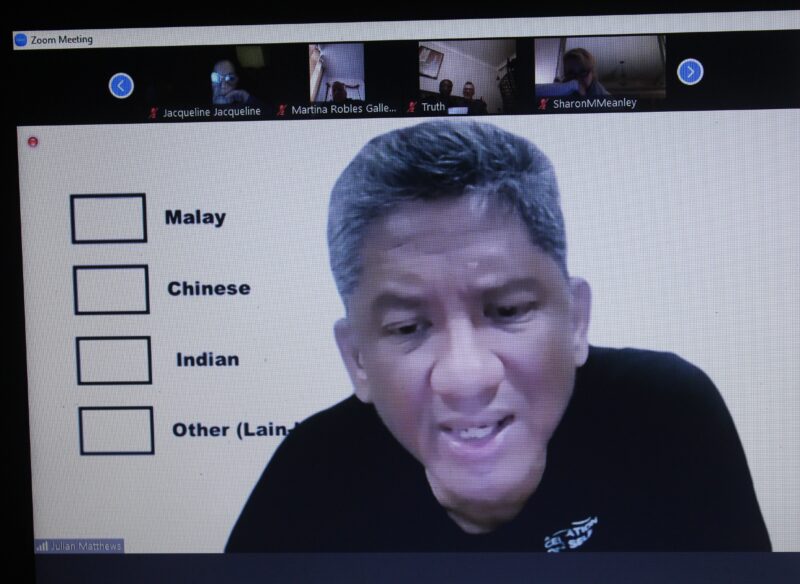
HCE: What’s next on the horizon for you? Are you already working on projects/booked for upcoming performances?
JM: I am just keen on writing, reading, learning and performing right now to hone my craft. I try to submit regularly to journals and anthologies. I am exploring other means to fund this practice apart from publishing books regularly. The first manuscript is in the works but I am in no hurry. I keep my head down and continue to fetch water and chop wood.
HCE: Is there anything we didn’t cover that you’d like to share with our readers?
JM: Life is rather absurd don’t you think? There are eight billion of us on Earth and all of us are going to die, yet we continue to bicker about the most trivial of things. Cosmologist Brian Cox says there are 400 billion suns in our Milky Way galaxy, and around two trillion galaxies in the universe. We are so small and finite in this vast and infinite universe. Yet, we are the only ones, presumably, who are the stewards of consciousness and meaning. Poetry, stories, music, art, dance, comedy, science brings meaning to an otherwise meaningless existence. If we wipe ourselves out, through our own folly, who is responsible for bringing meaning from all the thousands of generations that came before us and moving it forward for all the thousands of generations after us — even as we venture further and further out into space?
The average lifespan in the world is 72 years. I found poetry, or rather, ignored poetry until it found me very late in life. I only have a few years left to contribute and add my two bits of meaning to this world. I feel the burden of that responsibility. You should too. Everyone should. That thought alone should keep you up every night making art. My final message: Insomniacs of the world unite. You have nothing to lose but these chains of profound emptiness and whatever awaits everyone on the other side. Search, find and add meaning to everything you do. Be kinder to each other. Nothing else matters.
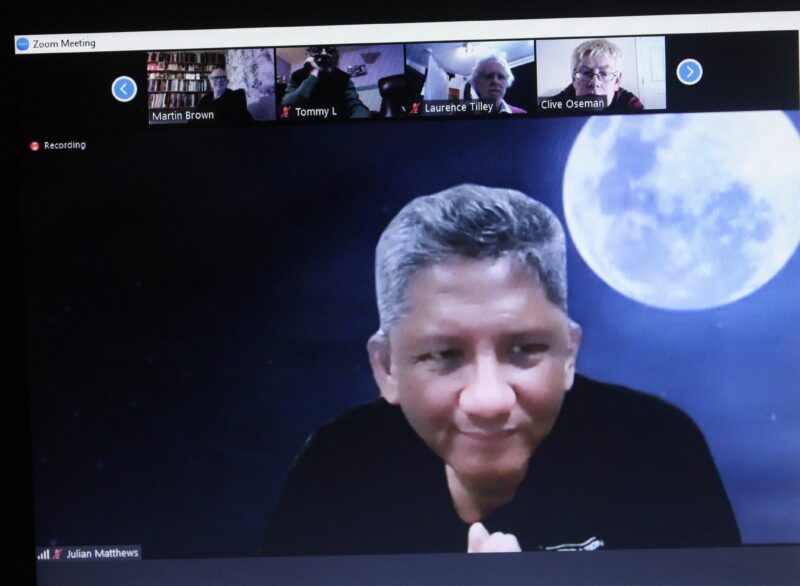
HCE: What’s the best way for people to keep connected with you and your work, or contact you about bookings?
If you wish to support Julian Matthews’ poetry practice, please Paypal him at trinetizen@gmail.com or at least send him Wordle answers.
